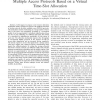Free Online Productivity Tools
i2Speak
i2Symbol
i2OCR
iTex2Img
iWeb2Print
iWeb2Shot
i2Type
iPdf2Split
iPdf2Merge
i2Bopomofo
i2Arabic
i2Style
i2Image
i2PDF
iLatex2Rtf
Sci2ools
140
click to vote
ICC
2007
IEEE
2007
IEEE
Quality of Service in Wireless Network Diversity Multiple Access Protocols Based on a Virtual Time-Slot Allocation
— In this paper, we propose a new resource allocation mechanism which is designed to improve the multiuser detection of wireless network diversity multiple access (NDMA) protocols. The mechanism consists of allocating an average number of timeslots to the active user population according to a prescribed quality of service requirement. It is dubbed virtual because it does not rely on user scheduling over different time-slots, but instead it is controlled by adjusting the probability of false alarm of each user. The allocation mechanism improves the throughput of conventional NDMA protocols at the expense of both an access delay degradation and an increased system complexity. The system requires to recover the signals from a mixing system with more outputs (the collected network transmissions) than inputs (the collided packets). By setting the average allocated time-slots to remain constant over different traffic loads, both the optimum transmission probabilities and the stability reg...
Related Content
| Added | 02 Jun 2010 |
| Updated | 02 Jun 2010 |
| Type | Conference |
| Year | 2007 |
| Where | ICC |
| Authors | Ramiro Samano-Robles, Mounir Ghogho, Desmond C. McLernon |
Comments (0)

